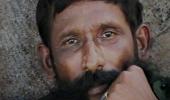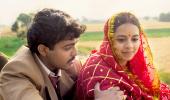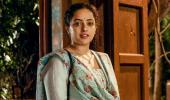'What the film shows is an India, which was headed in a completely different direction than where we are headed.'

Anand Patwardhan, 73, is the godfather of Indian documentary cinema, and he does not shy away from speaking the truth, as he sees it.
He has made a range of films dealing with India-Pakistan's nuclear ambitions, the plight of slum dwellers in Mumbai, the repressive caste system and the rise of the Hindu fundamentalism in the country.
While his films never had wide distribution, playing mostly at film festivals abroad and in India, as well in universities and colleges, the subjects he deals with have brought him in direct conflict with the governments in power. Yet, Patwardhan has never compromised in speaking the truth as revealed through his films.
Patwardhan was born in 1950, a few years after India became independent. His vision of a secular India and belief in non-violence makes him a true inheritor of the legacies of Jawaharlal Nehru and Mahatma Gandhi.
In his latest documentary, The World is Family (Vasudhaiva Kutumbakam), Patwardhan takes us through the lives of his late parents and other family members, all of whom were part of India's freedom movement. He also shares photographs of family members with leaders of India's freedom movement. The result is a heartwarming essay where the filmmaker reveals the basis of his political understanding.
The World is Family premiered last month at the Toronto International Film Festival and will have its India premiere at the Jio MAMI Mumbai Film Festival.
Anand tells Aseem Chhabra, "For nearly a decade, I was filming my parents because they were getting old and I wanted to preserve their memory. Only later on, because of the oral history that was coming out from talking to them, that I thought this might be interesting to other people."
Anand, this seems to be your most personal piece of film-making. Am I right in assuming that?
Yes, because I normally don't make personal films.
I made War and Peace, which was an anti-nuclear statement. It was in first person and I talked about my uncles.
This film was in the making for a long while. Why did you start to record your parents or you just enjoyed talking to them?
It was not meant to be a movie. It was a home movie.
For nearly a decade, I was filming my parents because they were getting old and I wanted to preserve their memory.
Only later on, because of the oral history that was coming out from talking to them, I thought this might be interesting to other people.
You are also in it a lot of the times. Usually in your other films, you would not bring yourself in the camera.
My voice is often in all of them. You can hear the voice but you can't see me.
Sometimes in a couple of films -- in Reason for instance -- you can see me in one or two places because we were using two cameras.

But assembling all the footage, after your parents have passed on, must have been quite emotional. It's one thing to look at old photographs but you had this footage. Then you sat through the editing process.
It wasn't fun. Some of the footage is very hard to watch, especially when they were unwell.
When you are shooting, you have to do it technically.
So even if there are moments where I get emotional, I can't let that interfere. But when I am editing, it's okay because you can watch it 100 times.
I was often at their home in Pune.
Because I am a film-maker, I always had some equipment. Here I have mostly used my B equipment. It was not the main camera that I use.
Yes, I could tell. There is a lovely home movies quality to it.
Your dad had had his stroke right at the beginning but as you say in the film, he made a promise to your mother.
My father was 13 years older than my mother.
But she made him promise that he won't die before her, and he kept his promise.
She kept him alive.
What comes out of the film is how close you were to your parents. How playful you were with them, playing cards, joking. The way your mother jokes says, 'Why do you have me looking like this?' They were aware of the camera.
Yes, and yet, they were not bothered because they weren't thinking of it as a movie.
We were very close. Not just my parents, but the whole family was close.

I think that's why there's a sweet quality to the film. What did you learn about your parents in making and especially, assembling the footage?
Even while making, there were stories which I hadn't heard. There was a lot I didn't fully understand.
The depth to which they were all involved in the freedom struggle, that they knew Gandhiji personally.
I have been attacked for being anti-national, so I wanted to show that my family was a part of the freedom struggle.
I think this is the first time you tell us why you are who you are. How it's in your genes.
But that's not just me. I am saying there's a whole generation that grew up in that environment.
Also this wasn't the intention, but what I hope people get from the film is to understand that the people who fought for India's Independence were very different from the people who are ruling us today.
What the film shows is an India, which was headed in a completely different direction than where we are headed.
What became of the lovely house where your parents live?
My parent's house in Pune is still there. My uncle lived there and after he passed away, my cousin lives there. I stay there sometimes when I go to Pune.
The memory is still there. The furniture is still the same.

Tell us about the thought behind the title of the film.
The World is Family can be seen in two ways. You can say the whole world is a family. And family is the world. So it's both ways.
During TIFF, Indiewire and Thom Powers (chief documentary programmer at TIFF) worked on a piece where a group of young documentary film-makers -- many who have won awards and were also nominated for Oscars -- talked about you and how your work has inspired them. It was great to get their perspectives, anecdotes and quotes. How did it feel when you read the glowing things the film-makers said about you?
I was very happy to see the article since it shows a kind of solidarity that we need.
It's not easy in the film-making world for there to be that kind of solidarity. Everyone is also competing with each other.
But here is an example of solidarity with people recognising that somebody else is also doing this work.
I understand the idea of solidarity. But obviously, this is not even a second generation after you. It's more like the third generation. But I am just saying that sense of your tradition, all the work that you have done, that stands by itself...
...And now, here is a younger generation carrying the torch forward.
Have you seen all of their works?
I won't say I have seen all of their works but definitely the current films.
I have seen the documentary about Ravish Kumar (While We Watched), Writing with Fire, All That Breathes and more.

What do you think of the new documentary cinema that's coming out of India? All That Breathes refers to the politics in the background and while mostly focusing on the environmental crisis in Delhi.
As he (Director Shaunak Sen) says in the IndieWire story, initially, he thought he didn't want to have a political message.
But then he understood that it's an integral part of the narrative.
Even in his first documentary, Cities of Sleep, you see that politics is an integral part of the story. I fought court battles to get my film on the slums (Hamara Shahar -- Bombay, Our City) released.
Documentary film-making is in good shape. A lot more subject matters are being explored.
Why do you think it's happening more at this juncture in time, even though many of the films are not being released in India?
One thing is that international money has become available to filmmakers.
In my case, I didn't take that money. Once you take the money, people who are funding you will also have a say in what's being made.
You never took money? Was it to retain your independence?
Yeah. It was also to make sure that the Indian government would never say there was some foreign hand in my films.
You see, my films were very directly political. It had to be a voice that came from the inside.
I understand. But it would have made life a little bit more comfortable for you. Documentary film-making is a struggle.
The films would have looked different.
It's a struggle, but when you make them with little money, you find ways of doing things differently and the format changes.












 © 2025
© 2025